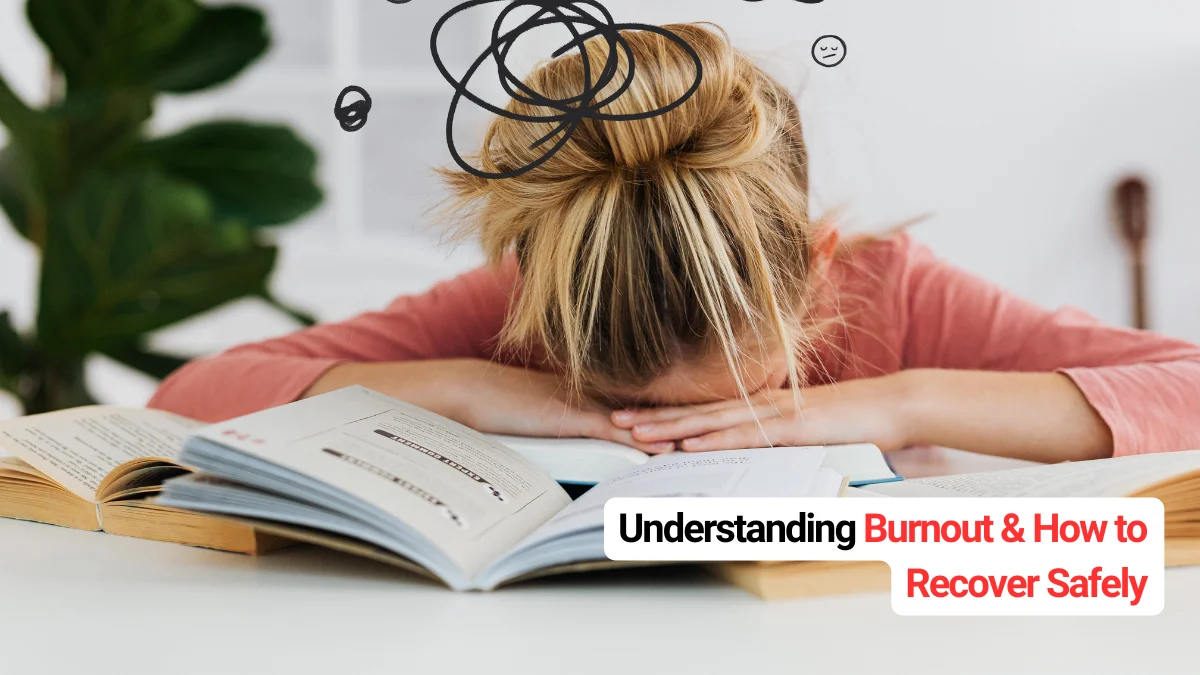Mental well-being affects how you think, feel, act, and handle daily stress. It influences relationships, decision-making, and the way you respond to situations. A healthy mind supports better confidence, motivation, and emotional balance. Many factors like genetics and life experiences cannot be controlled. But daily habits can make your mental health stronger and more stable.
Key Takeaways On Habits That Improve Mental Well Being
- Daily habits can improve mood, clarity, and emotional strength.
- Simple actions like sleep, movement, and sunlight support mental well-being.
- Small steps are easier to follow than large sudden changes.
- Building routines with kindness helps reduce stress.
- Healthy foods, rest, and mindful breaks improve long-term mental balance.
Build Healthy Sleep Patterns
Sleep is one of the strongest foundations for mental health. Poor sleep increases anxiety and irritability. A calm sleep routine supports better focus and balanced emotions. Studies also show that lack of sleep raises stress levels.
You can improve sleep by setting simple habits. Avoid caffeine after mid-afternoon. Keep your room cool and quiet. Try to sleep and wake up around the same time every day. A clean and relaxing room also supports better rest. If you face constant sleep problems, a sleep specialist can help with deeper guidance. Good sleep improves the way your mind reacts to pressure and daily situations.
Reduce Daily Digital Overload
Constant scrolling increases comparison and lowers self-worth. Social media triggers anxiety when your mind never gets a break. Reducing screen time can create more space for peace and clarity.
Start with small actions like keeping your phone away from your bed. Turn off notifications that distract you. Replace night scrolling with a book or quiet moment. Choose meaningful activities like writing, walking, or listening to calming music. Digital breaks help the mind reset and reduce stress.
Daily Habits That Improve Mental Well-Being
- Get regular sleep
- Reduce social media use
- Build strong relationships
- Move your body
- Eat nutrient-rich foods
- Take mindful breaks
- Practice gratitude
- Spend time outdoors
- Express feelings
- Explore creative hobbies
- Drink enough water
- Rest without guilt
1. Get regular sleep
A steady sleep routine supports your mind in ways you often notice only when it is missing. When you sleep at the same time every night your thoughts feel clearer and your mood stays more balanced. Your body gets a chance to reset and your mind wakes with better focus. Many people find that even simple steps like dimming lights in the evening help them fall asleep faster.
Sleep quality also affects how you handle daily stress. A tired mind reacts more strongly to small problems while a well rested mind responds with more calm. When sleep becomes a habit you feel a natural rise in energy through the day. Over time good sleep builds emotional strength and helps you stay steady during challenges.
2. Reduce social media use
Limiting social media gives your mind more room to breathe. When you constantly scroll your brain jumps from one piece of content to another without pause. This keeps your thoughts scattered and can raise anxiety. When you cut down your screen time your brain gets space to settle and stay in the present moment. Many people feel calmer after reducing their time online.
Lower use also helps you avoid comparison patterns that can harm confidence. Social platforms often show only perfect moments and not real life. When you step back you start noticing your own life more clearly. You may find you enjoy small daily moments that you earlier overlooked. With less noise from online spaces you feel more grounded.
3. Build strong relationships
Strong relationships create emotional safety and help your mind stay steady during ups and downs. When you talk to someone who listens you feel understood. This simple feeling reduces stress more than many people realise. You do not need large groups. Even one or two close bonds can make your mental health stronger. Regular conversations build trust and comfort.
Good relationships also help you stay motivated. Support from others gives you a sense of belonging which creates emotional strength. When you share thoughts with friends or family your mind releases strain you may not notice you are carrying. Over time these bonds build resilience and make life challenges easier to handle.
4. Move your body
Movement boosts mental well being by releasing tension stored in your muscles. Even simple activities like walking or stretching help your mind feel lighter. When your body moves your blood flow increases which improves focus and energy. You do not need a strict workout. Consistent small movements have a strong effect on mood.
Physical activity also helps reduce negative thoughts. When you move your attention shifts away from stress and settles into the present. This makes your mind clearer and calmer. Many people notice that after a short walk their mood lifts naturally. Over time regular movement becomes a reliable tool for emotional balance.
5. Eat nutrient-rich foods
Food plays a direct role in how your mind feels. When you eat meals full of vitamins and minerals your brain works more efficiently. Whole foods like fruits vegetables nuts and grains support steady energy. This helps you think clearly throughout the day without sudden dips. Many people feel calmer when they avoid heavy or processed options.
Balanced meals also help your body produce chemicals that support good mood. When your diet is stable your emotions feel more consistent. Nutritious eating also reduces fatigue and brain fog which improves how you handle daily tasks. Over time healthy food choices become part of a strong mental foundation.
6. Take mindful breaks
Short mindful pauses help your mind reset. When you step away from work or noise for a quiet moment your thoughts settle. These breaks reduce mental overload that builds up through the day. Even one minute of slow breathing can calm your body. Mindful breaks teach your mind to step out of stress and return to balance.
Regular pauses also improve productivity. When your brain gets small moments to rest it becomes sharper. You return to tasks with more focus and patience. Over time mindful breaks help you respond to challenges with ease rather than tension. This habit supports both mental and emotional stability.
7. Practice gratitude
Gratitude shifts your attention from problems to what is working in your life. When you take time to notice even small positive moments your mind becomes more balanced. This practice trains your brain to recognise comfort instead of stress. Many people feel an immediate lift in mood when they write down simple things they appreciate.
Over time gratitude helps you build emotional strength. You start seeing challenges with more understanding and less frustration. This creates a calmer mindset even during difficult days. Gratitude does not remove problems but it helps you approach them with more confidence and clarity.
8. Spend time outdoors
Being outside refreshes your mind in a natural way. Fresh air and open spaces help release tension you may not realise you carry. Your senses settle and your thoughts slow down. Even a short outdoor walk can improve focus and lift mood. Nature gives your mind a calming environment that supports recovery from daily stress.
Outdoor time also boosts creativity. When you step away from screens and busy settings your mind wanders freely. This can bring new ideas and clearer thinking. Over time outdoor moments become a powerful mental reset that helps you feel grounded and connected.
9. Express feelings
Talking about emotions helps you release mental weight. When you keep feelings inside they build pressure. Sharing your thoughts with someone you trust brings relief and clarity. It helps you understand your emotions instead of avoiding them. This habit supports emotional stability and improves communication.
Expressing feelings also improves relationships. When you open up others understand you better. This creates deeper trust and stronger support. Even writing your feelings in a notebook helps you gain insight. Over time expression becomes a natural way to process life events with a calmer mind.
10. Explore creative hobbies
Creative activities give your mind a healthy outlet. When you create something your focus shifts from stress to expression. This builds relaxation and joy. You do not need special skill. Simple things like drawing cooking music or crafting can bring comfort. Creativity allows your mind to wander in a pleasant and peaceful way.
Spending time on hobbies also improves problem solving. When your mind explores new ideas it becomes more flexible. This leads to better thinking and emotional balance. Creative hobbies act like gentle therapy and bring steady mental relief.
11. Drink enough water
Water keeps your brain functioning smoothly. Dehydration makes your mind feel dull and tired. When you drink enough water your thoughts become clearer and your mood feels more stable. Many people notice less irritability when they stay hydrated. This simple habit supports both physical and mental well being.
Drinking water also helps regulate energy. Your body works better when fluids are balanced. This improves focus and reduces fatigue. Over time hydration becomes a small but powerful tool for mental clarity.
12. Rest without guilt
Resting is important for mental health but many people struggle with guilt. When you allow yourself to slow down your mind heals. Rest restores your emotional strength and helps prevent burnout. Taking breaks is not laziness. It is essential care that allows you to return stronger.
Guilt free rest also improves self worth. When you accept that your body and mind need pauses you build a healthier relationship with yourself. This leads to more balanced days and calmer feelings. Over time rest becomes a natural habit that supports long term well being.
Strengthen Relationships and Social Support
Humans need connection. Healthy relationships make it easier to share emotions and receive support. Friends help reduce loneliness and improve mood. Check on people you care about. Send a simple message. Meet for a walk or short call. Small interactions build strong bonds. You do not need long conversations every day. Even small regular contact improves emotional stability.
Move Your Body in a Way You Enjoy
Movement supports mental well-being by reducing stress, improving mood, and helping you sleep better. Exercise releases natural chemicals that boost happiness. You do not need a hard workout. Choose movement that fits your style. A slow walk, stretching, dancing, or gentle yoga can calm the mind. Even a few minutes of stretching improves blood flow and relaxation. Pick activities that feel simple and enjoyable.
Eat for Better Mood Support
Food has a strong connection with mental health. Nutrient-rich choices support brain function and stable energy. Add foods like berries, bananas, beans, whole grains, and leafy greens. Fatty fish like salmon supports brain health. Drinking enough water every day also helps your mind stay alert and balanced.
Limit foods that increase anxiety like excess sugar, alcohol, and too much caffeine. Small diet changes help steady your energy and mood. Eating something is always better than skipping meals, especially on tough days.
Give Yourself Rest on Hard Days
Some days feel harder than others. Forcing yourself can make things worse. A gentle approach helps you recover without guilt. Rest can be a short break, breathing practice, warm bath, or stepping away from noise. Slow breathing exercises help calm the mind. Allowing rest gives your body space to reset.
Choosing one small step per day can build confidence. It can be making your bed, drinking water, or writing a short journal entry. Small steps help build long-term habits.
Create Moments for Mindful Rest
Rest does not always mean sleep. Rest can be pausing your mind, slowing down, and letting your thoughts settle. Simple practices like gentle breathing, sitting quietly, or meditative rest help restore peace. Many people use yoga-based rest routines to calm the body. Lying down comfortably, focusing on your breath, and staying still for a few minutes can reduce stress. A few minutes of calm each day improves emotional balance.
Time Outdoors Can Lift Your Mood
Sunlight increases vitamin D and supports better mood. Even five minutes outside can improve clarity. A short walk, sitting in your balcony, or standing in an open area helps your mind refresh. Fresh air and natural light reduce stress hormones.
Know When to Seek Help
Daily habits support mental health, but they cannot replace professional care when symptoms are strong. Therapy helps when emotional distress lasts longer than usual. Professional support is important if you notice constant sadness, anxiety, loss of motivation, sleeping issues, or increased anger. Talking to a therapist gives clarity, comfort, and healthy coping tools. You do not need a specific condition to seek help. Therapy is also a form of self-care.
Final Thoughts On Habits That Improve Mental Well Being
Mental well-being shapes how you experience life. You cannot control every factor, but daily habits can help you feel more stable, confident, and calm. Start with small steps instead of changing everything at once. These small habits create long-term strength. Over time, you will notice more balance, clarity, and emotional resilience.







